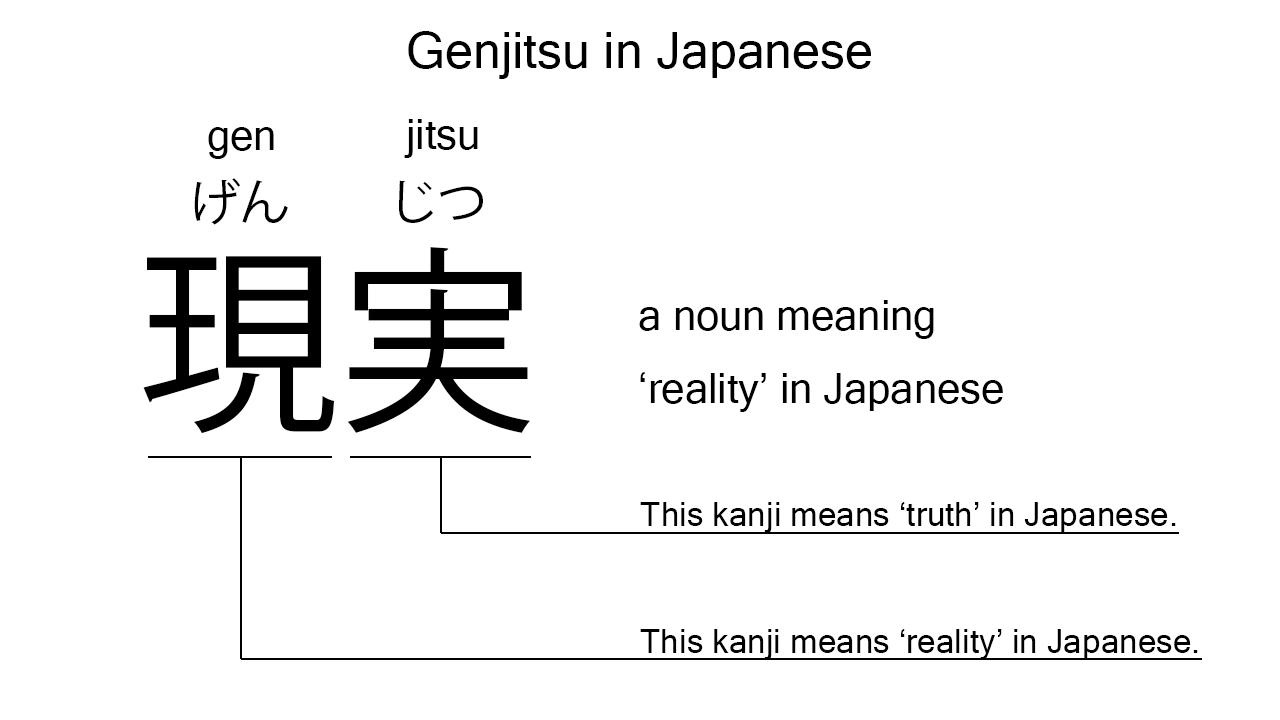What does “genjitsu” mean in Japanese?
Native speakers say “genjitsu” to mean ‘reality’ in Japanese. Perhaps, some Japanese learners know this word as it is sometimes used in Japanese movies, songs, novels, manga, anime, and the like. In this blog post, however, I will explain this word in detail based on its kanji expression. And also, I will explain how to use it through example sentences. My explanations would help Japanese learners understand “genjitsu” more clearly. Then, let’s get started!
Contents
Definition and meaning of “genjitsu”
Let me start with the definition and meaning of “genjitsu”.
- genjitsu – 現実 (げんじつ) : a noun meaning ‘reality’ in Japanese.
Japanese native speakers use this noun to refer to something real or the state of being real. So, this can work in more or less the same way as the English noun, “reality”, does.
The definition and meaning are simple and clear. To understand this noun more clearly, however, let me explain its kanji characters in detail, one by one.
What does “genjitsu” literally mean in Japanese?
The kanji expression of “genjitsu” consists of the following two kanji characters:
- 現 : a kanji character used to mean ‘reality’, ‘presence’, or ‘appearance’ in Japanese.
- 実 : a kanji character used to mean ‘truth’ or ‘reality’ in Japanese.
From these two kanji characters, we can understand that “genjitsu” literally means ‘reality and truth’ in Japanese. This literal interpretation is very close to the actual meaning.

When we meet new kanji expressions, we should check their kanji characters in detail to understand their meanings clearly and deeply. In many cases, kanji characters tell us a lot about the meanings of the expressions they form. Actually, here, we could get the better understanding of “genjitsu” through the detailed kanji check above.
So far, I’ve explained the definition and meaning of “genjitsu” together with its kanji characters. Then, let me explain how to use it through the example sentences below.
Example #1: how to say “reality” in Japanese
boku no yume wa genjitsu to nat ta – 僕の夢は現実となった (ぼくのゆめはげんじつとなった)
My dream became a reality.
Below are the new words used in the example sentence.
- boku – 僕 (ぼく) : a pronoun meaning ‘I’ in Japanese. This is used mainly by boys and young males.
- no – の : a case particle used after a noun or pronoun to make its possessive case. In the example, this is used after “boku” to make its possessive case, “boku no”, which means ‘my’ in Japanese.
- yume – 夢 (ゆめ) : a noun meaning ‘dream’ in Japanese. This can also work as plural.
- wa – は : a binding particle working as a case marker or topic marker. In the example, this works after “boku no yume” to make the subject in the sentence.
- to – と : a case particle used to say what someone or something becomes after a change or action. In the example, this is used after “genjitsu” to say what the speaker’s dream became.
- nat – なっ : one conjugation of the verb, “naru”, which means ‘to become’, ‘to get’, or ‘to turn’ in Japanese. In the example, it has been conjugated for the better connection with its following word.
- ta – た : an auxiliary verb used after a verb, adjective, or auxiliary verb to make its past tense form. Probably, this is well known as a part of Japanese ta form. In the example, this is used after “nat” to make its past tense form, “nat ta”.
This is a typical usage of “genjitsu”. In this example, it works as a part of the phrase, “genjitsu to nat ta”, which literally means ‘to have become a reality’ in Japanese. This phrase should be learnt together with its present tense form, “genjitsu to naru”.
Example #2: another usage of “genjitsu”
boku tachi wa genjitsu kara nige ta – 僕達は現実から逃げた (ぼくたちはげんじつからにげた)
We escaped from the reality.
Below are the new words used in the example sentence.
- tachi – 達 (たち) : a suffix used after a noun or pronoun to make its plural form. In the example, this is used after “boku” to make its plural form, “boku tachi”, which means ‘we’ in Japanese.
- kara – から : a case particle used to say where something starts. In the example, this is used after “genjitsu” to indicate the object from which the speakers escaped.
- nige – 逃げ (にげ) : one conjugation of the verb, “nigeru“, which means ‘to escape’ in Japanese. In the example, it has been conjugated for the better connection with its following word.
This is another typical usage of “genjitsu”. In this example, it works together with the case particle, “kara”, to say “from the reality” in Japanese. When we want to refer to something real or the state of being real in Japanese, anyway, this noun is always a very good option.
Summary
In this blog post, I’ve explained the definition and meaning of “genjitsu” in detail based on its kanji expression. And also, I’ve explained how to use it through the example sentences. Let me summarize them as follows.
- genjitsu – 現実 (げんじつ) : a noun meaning ‘reality’ in Japanese. Japanese native speakers use this noun to refer to something real or the state of being real. So, this can work in more or less the same way as the English noun, “reality”, does. These two kanji characters literally mean ‘reality and truth’ in Japanese. This literal interpretation is very close to the actual meaning.
Hope my explanations are understandable and helpful for Japanese learners.